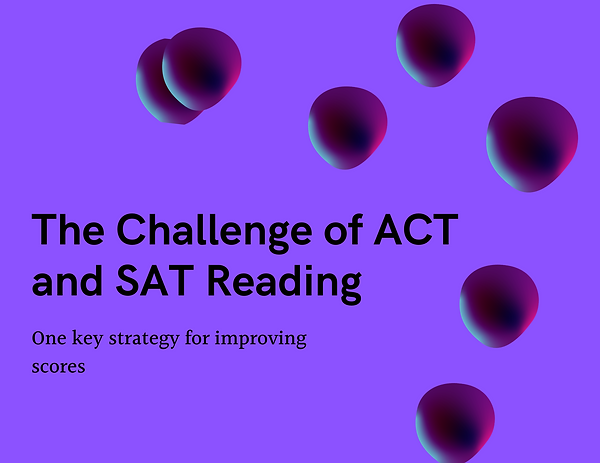
The Challenge of ACT and SAT Reading
Hey, I was just asking for a list!
I saw some comments to a post in a Facebook Group the other day that seemed very familiar. The post asked if anyone knew of a list of certain adjectives that don’t follow the basic rule for the comparative and superlative forms. (Think ‘beautiful, more beautiful, most beautiful’, rather than ‘cool, cooler, coolest’.)
The comments mostly discussed the basic rule (that the poster wasn't interested in!). They gave useful information about doubling the final consonant and changing the -y ending to -i. But then, at some point, the author of the original post said something like “Hey, I just asked for a list!’
Losing sight of the question
I realized that this exchange reminded me of my work with students doing test prep. Much of my work with students on ACT and SAT reading sections comes down to helping students learn to pay attention to the question that is asked, and then answering that question.
Unfortunately, test-takers faced with the stress of the test, limited time, and sometimes, a lack of familiarity with reading closely, can lose sight of the question. Just as many of us do in our everyday reading, they skim the question and the text. Maybe they dredge up whatever they remember from the passage, informed by their own prior experiences. Then they look for an answer choice that matches something they have recalled.
If this was on a test
Here’s how this might look on a test, using the first paragraph of this post as our sample text.
Question: If someone wanted to provide the best response to the poster's request they would
A. Direct the author to a grammar site online
B. Provide information about the grammatical rules involved
C. Send catalogs of adjectives that change in different ways from the usual
D. Suggest that the author use a different way of describing the noun
Responses A and B are very tempting for readers who skimmed the paragraph and summarized it as ‘a grammar issue’. Response D may seem a little off topic, but when you’re taking the test and are wary of being ‘tricked’, it may not seem wrong – after all, it does correctly refer to adjectives as describing nouns, so it’s still in the neighborhood of the question.
The answer that actually addresses the poster's request is C. Catalog is a synonym for list, and changing in different ways is on topic.
So many variations on this theme
There are many variations on this: the question may ask for a closing sentence that most effectively emphasizes a point (X) that the author wants to make - the answers include some reasonable closing sentences, but only one emphasizes point X; or the question asks which sentence is a good transition from the previous paragraph and connects to the first paragraphs of the selection - there are some okay transitional sentences, but only one provides the connection to the beginning of the passage, and on it goes.
What is a student to do?
I have my students focus on the question, not the answers, on their first look at a passage. They put the question in their own words, look back at the passage if they need to, and only then look at the answer choices. This helps them to focus on the question that is asked.
Just remember, when they ask for a list, give them a list!






